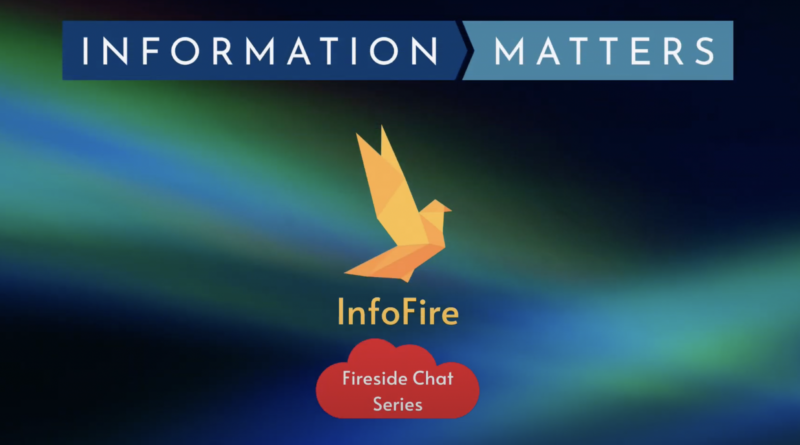Changing Contours of the iField: A Fireside Chat with Mike Eisenberg
Changing Contours of the iField: A Fireside Chat with Mike Eisenberg
Shalini Urs
Academic disciplines emerge and evolve in response to society’s challenges. Listen to this episode of the fireside chat series, InfoFire, by Information Matters, with Professor Mike Eisenberg, Dean Emeritus, University of Washington Information School. In this episode, he takes us through the changing contours of the iField. Tracing the beginnings of the field of information (iField) to the origin of human civilization, he says the world of information began to unfold with homo sapiens and their information processing capabilities (or, as Yuval Noah Harari says in his book Sapiens, the cognitive revolution). According to Eisenberg, all revolutions—hunter-gatherer, agricultural, industrial, and information revolutions are information-based. While libraries institutionalized information, the field took off since World War 2 and technological developments.
As the founding dean of the UW iSchool, Eisenberg presents a ringside view of the emergence of the iField. He sketches the milestones in the iSchool movement from the gang of three, four, and five to the iSchool Caucus and the spread of the iSchool movement across the world. The phrase the Information School began with UW, and the moniker of iSchool caught on like wildfire, he says. He analogizes the “i” in iSchools to the “i” in iPhone or iPad.
Acknowledging that iField is the crossroads that brings together computing, mathematics, social sciences, psychology, technology, management, business, and others, Eisenberg contends that iField has its foundational principles in information/knowledge organization and information retrieval. He names prominent researchers who laid the foundations of information science—Gerald Salton, the father of Information Retrieval; Michael Buckland; Nicholas Belkin; Tefko Saracevic; Brenda Dervin, and others, including the Cranfield Experiments from the UK. Today, information organization, processing, information systems, human-computer interaction, ethics, and such issues are the foundational principles that characterize the iField.
iSchools distinguish themselves as the center of the triangle of information, technology, and people; Eisenberg, who coined the term “the big tent,” reiterates that iSchools should adopt a broad-based and inclusive approach and collaborate with disciplines as varied as philosophy and medicine. He argues that we should partner with other fields, be inclusive, and embrace different streams. He is a proponent of collaboration, cooperation, and coordination amongst iSchools and across schools. As information is fundamental and the basis of every field, he appeals to iSchools to partner with elementary and high schools to make learning information skills essential.
He entreats us to be incredibly ambitious to bring opportunities to as many people as possible and prospects that iSchools could take a leadership role in the world, particularly academia, in using information and technology for the greater good by increasing opportunities for everyone. Quoting Darth Vader in Star Wars, who tells Luke “you need to embrace your destiny. This is your destiny,” he implores that we in the iField ought to fulfill our destiny. Eisenberg is best known for his innovative approach: the Big6 Skills and believes that the iField has the power to make this world a better place. His message to the youth in the iField—follow your passion, seek fulfillment, and make the world better (his motto is “Make it better.”).
Cite this article in APA as: Urs, S. (2022, March 7). Changing contours of the iField: A fireside chat with Mike Eisenberg. Information Matters, Vol. 2, Issue 3. https://informationmatters.org/2022/03/changing-contours-of-the-ifield-a-fireside-chat-with-mike-eisenberg/
Author
-
Dr. Shalini Urs is an information scientist with a 360-degree view of information and has researched issues ranging from the theoretical foundations of information sciences to Informatics. She is an institution builder whose brainchild is the MYRA School of Business (www.myra.ac.in), founded in 2012. She also founded the International School of Information Management (www.isim.ac.in), the first Information School in India, as an autonomous constituent unit of the University of Mysore in 2005 with grants from the Ford Foundation and Informatics India Limited. She is currently involved with Gooru India Foundation as a Board member (https://gooru.org/about/team) and is actively involved in implementing Gooru’s Learning Navigator platform across schools. She is professor emerita at the Department of Library and Information Science of the University of Mysore, India. She conceptualized and developed the Vidyanidhi Digital Library and eScholarship portal in 2000 with funding from the Government of India, which became a national initiative with further funding from the Ford Foundation in 2002.
View all posts





